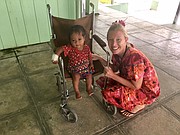Volunteers provide women's health services on isolated Pacific island
From a wing in one of two hospitals serving the Marshall Islands, Flathead Valley medical workers joined a team of doctors to treat a growing line of patients, many who had waited years to visit a women’s health clinic.
In the pop-up clinic’s two weeks, the volunteer gynecology specialty team treated more than 450 patients. The group, organized by the nonprofit Canvasback Missions, included eight medical workers from the Flathead.
Kasey Patton, a women’s health nurse practitioner at Kalispell OB-GYN Associates, said she didn’t know what to expect when she signed up for the short-term mission.
As the cohort flew into Majuro in February, the plane tilted right revealing the narrow strip of land they would be operating a women’s clinic. From the windows, the nurse practitioners, surgeons and technicians could see the collection of islands in the central Pacific Ocean made from the rim of a submerged volcanic crater.
“It was beautiful, and I knew it was an isolated area,” Patton said.
That isolation was part of the reason why they were there, she added.
Canvasback Missions has provided medical supplies and multiple specialty teams annually to the underserved populations of Micronesia since 1981.
Dr. Kathy Nelson, a gynecologist at Kalispell Regional Medical Center, said the primary purpose of the trip was to offer cervical cancers screening.
“There were women with advanced cervical cancers we rarely see in the U.S. because of screening,” she said.
The medical staff at the one-story hospital in Majuro cleared out several rooms and an operating room for the temporary clinic.
Patton said from 8 a.m. to 6 p.m., the clinic’s waiting room held an average of 75 people. Some women needed a routine preventative exam while others had tumor masses large enough to appear pregnant.
“We saw women from 18 on up to 65, some who never had a female exam done before,” Patton said. “In the U.S., if someone has a little twinge, they’ll usually go to the doctor. But these women won’t say anything — they don’t expect to have treatment.”
Nurse practitioners staffed the clinic and conducted routine exams while spotting cases they needed to send along to a physician. They worked with Marshallese nurse-practitioner students who provided translation between the foreign workers and patients.
The medical team taught the students how to conduct exams while the students taught the team how to operate within the community’s cultural norms.
Simultaneously, the visiting mammography and ultrasound technicians paired with Majuro medical workers to teach them how to use the equipment.
“They were really happy to have us there,” Nelson said. “But it wasn’t that they just expected us to come in there and fix everything. Otherwise, what happens when a person needs help two, three weeks or years later? They wanted to learn.”
She said Canvasback chose the location because the hospital had the infrastructure to set up a successful short-term clinic.
“It was amazing how they made due with limited resources, and we don’t do that anymore — everything here has to be amazing, and [in Majuro] they can provide really good care despite limited resources.”
When rain dripped through the ceilings onto the hospital hallways, surgical buckets collected the water. Plastic lawn chairs were in waiting rooms. Some patients shared rooms, separated by curtains. And people brought their own food, sheets and water when they needed an operation or had a hospital stay.
Patton said with the number of people waiting to be served paired with logistics of the Majuro hospital staff tweaking their routine to help the mission, the clinic operated in a constant rush.
Patton said without the local crew’s help, the drop-in team wouldn’t have been able to operate.
“I always felt like we were trying to just get through as much as we could,” she said. “Some people waited in line all day, so when there were still women in line past hours, the [Majuro] staff would stay even though they didn’t get paid for staying after 5 p.m. — they want to help their own.”
For more information about Canvasback Missions, visit http://www.canvasback.org/kalispell.
Reporter Katheryn Houghton may be reached at 758-4436 or by email at khoughton@dailyinterlake.com.




